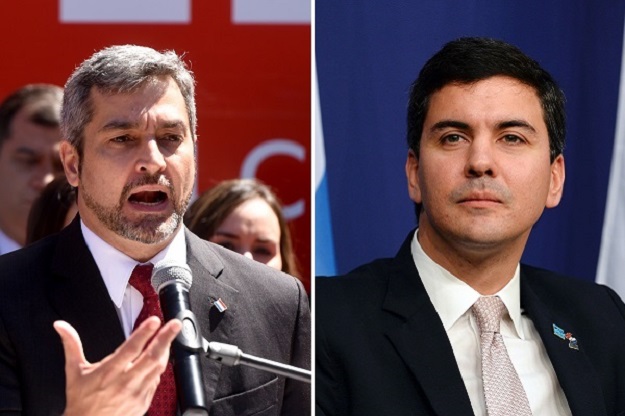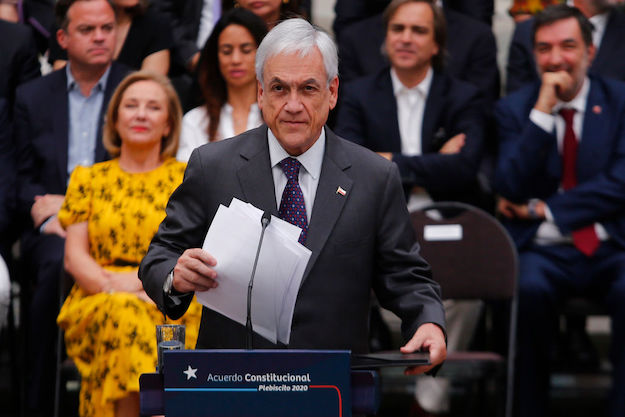ASUNCIÓN – When Paraguayans go to the polls on Dec. 17 to choose their parties’ candidates for April’s presidential race, incumbent President Horacio Cartes will not – despite his best efforts – be on the ballot.
But Cartes’ legacy, shaped partly by his controversial push for re-election and the protests it sparked, will be.
That’s especially true in the close race to represent the ruling National Republican Association, or Colorado Party, which pits one of Cartes’ closest allies with one of his biggest critics, and could widen a divide that may threaten the party’s long-standing hold on power.
In one corner stands Santiago Peña, a former IMF employee, finance minister and Cartes’ protégé. In the opposite corner stands Mario Abdo, a senator and former businessman, whose father was private secretary to former dictator General Alfredo Stroessner.
The two candidates represent distinct visions for the future of the party—one led by Cartes, and now his chosen successor, Peña, or a return to the traditional party of years past, led by Abdo.
The issue of re-election, and ultimately Cartes’ future political career, is a defining element in the race. Peña, who leads a faction of the Colorado Party loyal to the president, is expected to take up Cartes’ cause of amending the constitution to permit re-election. Such a move might pave the way for Cartes to run again in 2023.
Abdo, on the other hand, opposed the president’s re-election efforts. He is on the record as supporting re-election, but not for the president under whom it is passed.
These core differences could be decisive in gaining the edge in a race, whose victor is likely to become the country’s next president, many commentators believe.
Long the dominant force in Paraguayan politics, the Colorado Party has been in government for all but five of the last 70 years and boasts a well-oiled and well-financed electoral machine. The opposition alliance, on the other hand, was cobbled together between the Authentic Radical Liberal Party (PLRA) and the leftist Guazú Front, and remains a weak alternative.
“None of the PLRA candidates standing for the presidency incite passion,” said Estela Ruiz Diaz, a political commentator and columnist. “And the opposition still has to settle its own feuds.”
With the opposition alliance already written off by many, the focus in the run up to the elections has been on the clash between Peña and Abdo.
While the re-election issue may factor into voters’ decision, there is, in policy terms at least, little separating the two.
“It’s all at the level of vague rhetoric,” said Andrew Nickson, an expert on Paraguay at the University of Birmingham in the UK.
Both Abdo and Peña would continue Cartes’ focus on driving economic growth by encouraging economic reforms and foreign investment. On social questions, each has made vague promises to improve efficiency in healthcare and education. Peña indicated at one point he had no problem with marriage equality – before rolling back on this position under party pressure – and said he is open to a debate on abortion. Abdo, a devout Catholic, opposes both.
“Generally speaking, there still isn’t a social demand for the introduction of policy politics in Paraguay, so they can get away with it,” Nickson told AQ.
What really divides the candidates may be their personal backgrounds. Backed by the Colorado old guard, Abdo is a party man through and through. Peña, on the other hand, is a convert to the Colorado party. A member of the opposition Liberal party as recently as October 2016, he was coaxed across the aisle by Cartes, himself a political outsider.
“Peña comes from the Liberals. This is difficult to accept for some Colorados,” said Hugo Estigarribia Gutiérrez, a former Colorado Party senator. “Abdo is a politician who represents the party’s traditions.”
Abdo’s campaign has adopted a slightly populist tone, using the slogan “president of the people”, an image aided by Peña’s more cosmopolitan views and lack of fluency in Guaraní, the indigenous language spoken by roughly 90 percent of Paraguayans.
Peña’s ties to the current administration of Cartes, a millionaire businessman, may also hurt him: Roughly 70 percent of Paraguayan’s disapprove of Cartes’ presidency.
During his five-year term Cartes has pushed infrastructure investment, seeking to tempt foreign capital to take advantage of the country’s low taxes. His policies have left the economy in a relatively healthy state, with real GDP growth consistently around 4 percent in recent years, drawing praise from the IMF.
But this growth has failed to trickle down to the worst off in society, in what remains one of the region’s most unequal societies. Poverty levels have remained stubbornly high and in 2016 grew slightly to 28.9 percent from the 28 percent when Cartes took office. Abdo’s campaign has seized on this, promising to bring about a more inclusive form of economic growth.
As the campaigns enter the final stretch, the key risk now for the divided Colorado Party is an acrimonious end, leading to a potential split. A tight vote could result in accusations of impropriety.
“If there are indications of fraud on the part of the government, there could be a rupture in the party which would favor the opposition in April,” said Alfredo Boccia, a political commentator.
The Colorado tradition is to reconcile with a “republican hug” after elections. That said, it was an inability to work together in this fashion after the 2007 primaries that saw many Colorado voters break away to back the opposition alliance. That split led to the election of the ex-bishop Fernando Lugo as president in 2008, ending 60 years of Colorado hegemony.
The latest poll, published a week before the vote, puts the two candidates neck and neck, with 0.2 percent difference in support. And Abdo has already laid the groundwork for accusations of voter fraud.
The hug is not a certainty yet.
—
McCormick is a freelance journalist.







